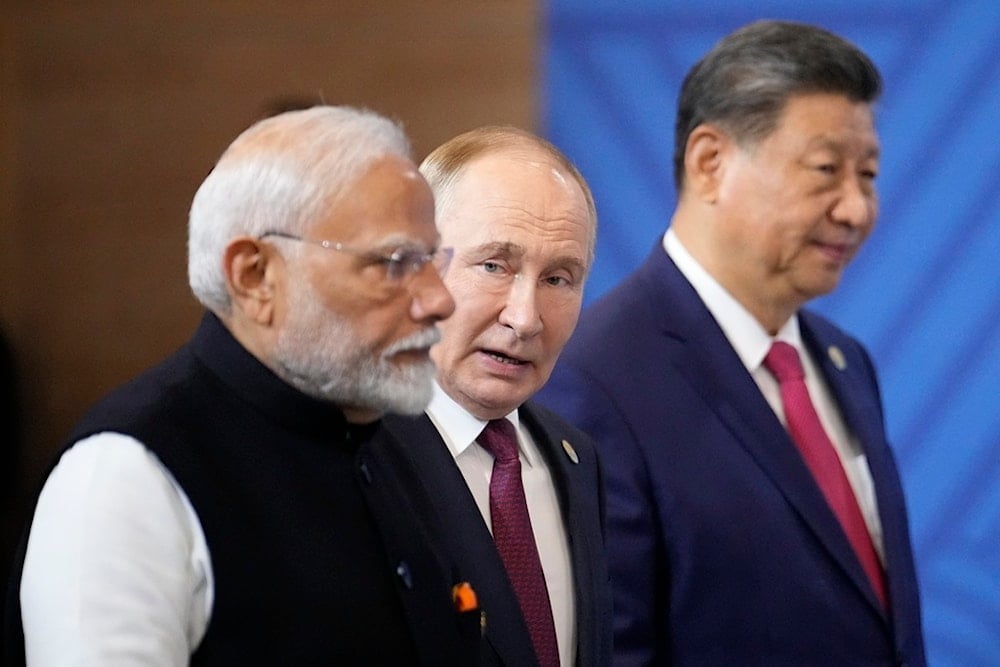Putin aide confirms 13 nations eyed for BRICS expansion: Reuters
The final BRICS communique is expected to include references to peace proposals from China and Brazil, which have been advocating for a ceasefire at the UN.
-

From left, Indian Prime Minister Narendra Modi, Russian President Vladimir Putin and Chinese President Xi Jinping attend a family photo ceremony prior to the BRICS Summit plenary session in Kazan, Russia, Wednesday, October 23, 2024. (AP, Pool)
Reuters reported on Wednesday that BRICS leaders are drafting plans to further expand the alliance amid concerns about the geopolitical and economic implications of rapid growth.
During the BRICS summit, chaired by Russian President Vladimir Putin in Kazan, discussions focused on how to manage the growing interest from countries in the Global South and East in joining the bloc.
BRICS, which originally consisted of Brazil, Russia, India, China, and later South Africa, now accounts for 45% of the global population and 35% of the world’s economy. More than 30 states have also expressed interest in becoming members.
However, concerns have arisen among existing members about how such a large and diverse grouping can maintain cohesion while achieving meaningful economic and geopolitical objectives.
"It is necessary to maintain a balance and prevent a decrease in the effectiveness of BRICS," Putin remarked, noting the importance of managing expansion carefully.
Yuri Ushakov, Putin's foreign policy aide, also noted the complexities of further expansion, saying, "We will need to talk to them about their degree of readiness to join either full-fledged membership in BRICS, or in some appropriate form." He further confirmed to Reuters that 13 countries have been identified as potential candidates for expansion.
Read more: BRICS authority, influence in global affairs continually rising: Putin
The BRICS summit also addressed pressing global issues, including the war in Ukraine. Indian Prime Minister Narendra Modi publicly called for peace, while Chinese President Xi Jinping held closed-door talks with Putin about the conflict.
The final BRICS communique is expected to include references to peace proposals from China and Brazil, which have been advocating for a ceasefire at the UN.
While Putin expressed openness to these proposals, he reiterated that Russia would not trade away the territories it has claimed in the Donbass and Crimea.
The summit concluded with Putin asserting that the growing interest in BRICS reflects the failure of Western efforts to isolate Russia, and that BRICS will continue to play a pivotal role in reshaping global alliances.
Russia now controls a fifth of Ukraine
The war in Ukraine, which began in 2022 following years of tension, continues to dominate discussions at international forums like BRICS, even as the bloc explores further enlargement.
Russia annexed Crimea in 2014. In the eastern Donbass region, Russia holds most of the territory, including significant parts of the Donetsk and Luhansk oblasts, areas that have been at the heart of the conflict since 2014.
Additionally, Russia controls major portions of the Zaporizhzhia and Kherson regions in the south, which are strategically important due to their industrial, agricultural, and logistical significance.
Read more: Putin revamps Russia's nuclear rules, unveils new arsenal guidelines

 3 Min Read
3 Min Read








